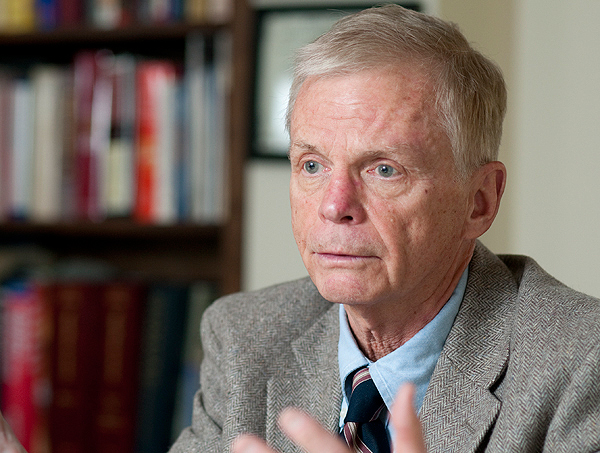Q&A: Hoover's Tom Henriksen on end of combat troops in Iraq
President Barack Obama announced an end to America's combat role in Iraq on Tuesday, saying "it is time to turn the page" after the U.S. "has paid a huge price to put the future of Iraq in the hands of its people."
The war in Iraq has stretched for more than seven years, cost about $1 trillion and claimed the lives of more than 4,400 American soldiers and 70,000 Iraqis.
Even as the president sought to turn his focus toward domestic problems like the nation's economy, questions remain about Iraq's security and political stability, as well as the ongoing war in Afghanistan.
Tom Henriksen, a senior fellow at Stanford's Hoover Institution, spoke with Stanford Report about Obama's Oval Office speech and what lies ahead for Iraq's stability, America's involvement in the country and Obama's plans for Afghanistan.
Henriksen specializes in American diplomatic and military courses of action toward terrorist havens.
Are you convinced that Iraqis are ready to assume responsibility for their own future? How optimistic are you about a peaceful, democratic and pro-American Iraq?
The president did his best to tell the Iraqis that it's time for them to take charge and form a government that's fair and responsive to the people. But they've had several months since the March elections, and they haven't really convinced us they'll do it. Let's hope I'm wrong and they'll resolve this issue. But there's a lot to be done. It's a terribly fractured state, and this won't be an easy journey for them.
U.S. troops are scheduled to remain in Iraq through 2011 in an advisory and training role. What can we expect of America's involvement with Iraq from now on?
The role of the troops is now dramatically different, but there are some elements of the past combat role. There are still 4,000 special forces troops that are staying there, and their role is really to attack al-Qaida elements. That will persist, and al-Qaida and other insurgent elements will likely try to humble and humiliate the United States whenever it can. The truth is, these remaining troops will still be exposed. I don't think we've seen the end of American casualties.
After 2011, I think we'll still be involved in Iraq. We fought against Germany, Italy, Japan and Korea. In all of those four areas, we still have troops stationed. So there might be some soldiers and some bases left in Iraq after the end of 2011 no matter what President Obama says at this time. And that's in our interest. We want a stable and peaceful Iraq for two main reasons. One, of course, is oil. And second, there's the threat of terrorism. Those factors make it very difficult for the United States to totally pull out, wash its hands and just walk away.
Obama said the drawdown in Iraq frees up resources for the United States to "go on the offense" against terrorists. How will this affect the fighting in Afghanistan and influence the war on terror?
He's already said that the American troops we have in Afghanistan are pretty much it. We're roughly at 98,000 and we're not going to commit more. I think we'll see a step up on anti-terrorist activities in places like Yemen and Somalia. That is not to say we're going to invade with large armies, but we'll certainly send special forces and drones to attack people.
Politically speaking, how did his speech resonate?
It was a good political stump speech, and I don't mean that in a derogatory way. He came across as a president who is very pro-military, and he came across as being very focused on restoring the American economy. In a speech like this, a president has to speak to a domestic audience, and that's a fractured audience. But you also have to speak internationally – to our allies and friends, whom he thanked. Finally, he has to speak to our adversaries. And he promised that he'd go after them. He covered his bases in this speech.


Share This Story